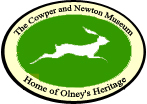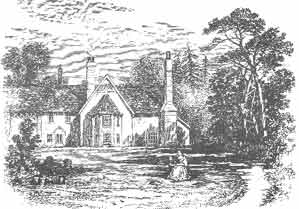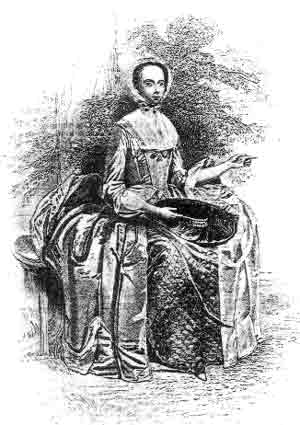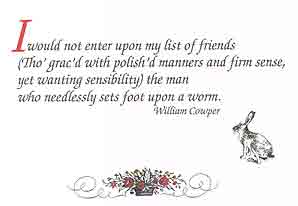|
THE MUSEUM PEOPLE
WORKS ORCHARD SIDE GARDENS |
 |
|
The Cowper and Newton Museum
|
||||
|
William Cowper
|
||||
|
1731-1768: The Early Years |
||||
Cowper was the fourth child of Rev. John Cowper, Chaplain to George II. He was born in Great Berkhamsted; however his older siblings died and his mother Anne died in childbirth when his brother John was born; William was not yet six years old. He was sent to Dr Pittman's Boarding School where he was severely bullied for two years until his persecutor was expelled. When he was ten he went to Westminster School where his interest in the Classics was fostered. He left Westminster and was articled to Mr Chapman. He spent much time at his uncle Ashley's house in Southampton Row with fellow clerk Edward Thurlow - later to become Lord Chancellor - where according to Cowper they spent a great deal of time "constantly employed from morning to night in giggling and making giggle" the daughters of the house. Later he was admitted to the Inner Temple and was called to the Bar in 1754. He founded the Nonsense Club, a society of Westminster men who dined weekly and produced ballads - "two or three becoming popular". He was appointed Commissioner of Bankrupts which gave him an income of £60 p.a. but he never actually practised as a barrister. He was offered the appointment of Clerk of the Journals of the House of Lords but despaired when he learnt that he would have to qualify himself at the Bar of the House in front of the Law Lords. This worry aggravated his depression so much that he made three suicide attempts. He was placed in Dr Nathaniel Cotton's Asylum in St Albans. Dr Cotton was a poet and evangelical in his religious persuasion. Cowper so improved under his care and so enjoyed his company that he stayed at St Albans after he had recovered. It is suggested that while here he wrote the hymn How blest thy creature is although it was first published in the Olney Hymns in 1779. He resigned as Commissioner and became dependent on relatives and friends for financial support. He moved from St Albans to Huntingdon to be nearer his brother John in Cambridge. (John was a Fellow of Corpus Christi College.) Cowper was no good at financial management and he and his servant managed to get through a year's allowance in three months.
Cowper met William Unwin coming out of Church, the young undergraduate making himself known to Cowper. They became fast friends. Unwin introduced Cowper to his parents; the Rev. Morley Unwin and his wife, Mary. He took up lodging with the family and a fortnight's stay became a 22 years connection. In a letter to his cousin dated 11th March 1767, Cowper writes:
He took up gardening at this time, no doubt finding it therapeutic and calming. On the 14th March he writes:
About 18 months after he first moved in with the Unwin family the Rev Unwin was killed in a riding accident and Mrs Unwin was resolved to leave Huntingdon and wished to live in a town where they would be under the pastorship of an evangelical minister. The Rev. John Newton had a letter of introduction to the Rev Morley Unwin and his interesting paying guest William Cowper and by serendipity he arrived at this time. Where better to go than Olney where Newton was the curate? |
||||
|
||||
|
|



